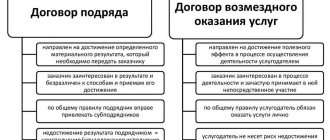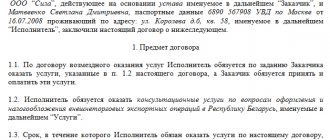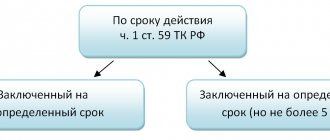Many enterprises in their practice are faced with a problem when they need to perform a certain amount of work, limited in time and frequency of execution. Typically, such transactions are one-time in nature. Hiring a specialist as a full-time employee on a permanent basis for a short period of time is impractical. It is expensive to enter into an agreement with a company that specializes in performing the required work. In such cases, many company managers or self-employed entrepreneurs hire a citizen as a performer, concluding a contract with him.
This document is a civil document regulating the labor relationship between an individual entrepreneur or legal enterprise with an individual for the performance of a certain type of service or any work. This form of relationship between employee and employer is today the most popular and least expensive.
Contract forms
The contract can be concluded in two forms:
- Oral form. When two individuals have agreed among themselves on the terms of a transaction, the amount of which does not exceed ten thousand rubles.
- Written form. If an agreement is concluded between legal entities and individuals and the transaction amount exceeds 10,000 rubles. It does not need to be notarized, which is confirmed by Article 161 of the Civil Code of the Russian Federation.
The distinctive features of such an agreement are:
- voluntary nature of the agreement;
- the contractor who was hired is not a full-time employee of the enterprise. No entry is made in his work book about the time of performance of services, i.e., the beginning and end of the period of labor activity. The organization does not issue or file orders for acceptance and dismissal from positions. The hours worked by the hired person are not included in the time sheet;
- the cost of work or services is not assessed according to the generally accepted wage scale for the enterprise, but is part of the contract and is prescribed for the full volume of services (work) performed, regardless of the time spent on the work;
- the mercenary is not subject to the general work schedule, can come and leave the workplace as needed and perform his part of the work at a time convenient for him. The main thing with this form of relationship is high-quality work delivered on time;
- the hired employee is not part of the workforce, but is obliged to comply with the rules of the organization and cannot violate the operating hours of the enterprise;
- a temporarily hired performer is deprived of all the benefits of full-time employees; he has no rights to paid leave, sick leave and other compensation payments and benefits provided by law.
Customer control over the work
The customer, in accordance with Art. 748 of the Civil Code, has the right (without interfering with the operational and economic activities of the contractor):
- monitor the progress of work and compliance with their schedule;
- control the quality of materials provided by the contractor and the correctness of their use;
- conclude an agreement with an engineer (engineering organization) and delegate to him your rights to control and supervise construction work.
The contractor has no right to deviate from the project: the customer who discovers such a deviation is obliged to report violations in the facility to the contractor. The customer who has not sent a notice to the contractor in such a situation does not have the right to refer to these violations. The contractor must comply with the customer's instructions unless they contradict the law and the contract and do not interfere with his operational activities.
In relation to capital construction projects, in accordance with clause 2 of Art. 53 of the Civil Code of the Russian Federation, the customer is obliged to exercise construction control. The functions of construction control are specified in the Decree of the Government of the Russian Federation “On the procedure for carrying out construction control” dated June 21, 2010 No. 48.
Features of the contract for 2021
As managers of some firms try to avoid additional tax burden on employees' wages, the practice of concluding contract agreements instead of employment agreements has become common practice. But since 2021, everything has changed.
Previously, the difference between an employment agreement and a work contract was the qualitative approach to the form of payment for an employee and his registration for work.
According to the law, after the legal formalization of the relationship between an individual - an individual entrepreneur and a hired employee, the employer must, within a working week, from the moment the new employee begins working, register the signed document with the state employment service at the place of registration of the individual entrepreneur. Along with the contract, the service is presented with a passport or other document by which the identity of the hired employee can be established, his work record book, where the relevant entry is made to the employees of the state body, and in some cases a document indicating the level of qualifications of the new team member.
In rare cases, they are required to provide a military ID or registration certificate if the employee has not reached conscription age, educational documents, and a certificate of health, including from a psychiatrist or narcologist.
Such documents are required in cases where an employee is invited to secret or military service, as well as to institutions that provide services for working with children, caring for the sick, or to catering establishments. In other cases, a passport with registration is sufficient. If an agreement is concluded with a foreign citizen, then he is required to present migration documents with permission to work in Russia. Typically, the validity of such an agreement is limited to the end date recorded in the certificate of registration of place of residence.
An employment contract differs from a work contract in that it is subject to mandatory registration, while the latter can be agreed upon orally and does not have notarial confirmation. According to the employment contract, the employer must pay insurance contributions to the Pension Fund for the entire amount of accrued wages.
From 2021, under a contract, along with an employment contract, the wages of an employee must be subject to insurance contributions if the individual hired by the enterprise was:
- services provided (for example, a real estate agent, translator, security guard, home teacher, clothing or equipment repairman, and others);
- articles, books, or other materials have been written, while the mercenary is only the nominal author of the copyright;
- fulfills obligations to provide services or work specified in the contract.
The exception is payments under contract agreements drawn up for rental services, purchase or sale of real estate, loan agreements or loans. These are the cases when insurance premiums for cash payments to individuals are not charged.
Delivery and acceptance of work
The customer, having received the contractor’s notification of the completion of the work (in full or an intermediate stage, if determined by the contract), must immediately begin accepting the work.
Acceptance is carried out at the expense of the customer (otherwise may be established by the contract). In cases specified by law, representatives of state (or municipal) authorities also participate in this procedure. Acceptance of construction work is documented and signed by both parties.
The customer has the right to refuse acceptance if the result of the work has fatal deficiencies that do not allow it to be used for the purposes specified in the contract. If one of the parties to the contract refuses to sign the acceptance certificate, the act is signed by the other party. A unilateral act of acceptance can be declared invalid by the court only if the arguments of the party that did not sign the act are recognized as justified.
Signing the work acceptance certificate does not deprive the customer of the right to raise objections in court regarding the quality of the work (clause 13 of the information letter of the Presidium of the Supreme Arbitration Court of the Russian Federation dated January 24, 2000 No. 51).
Contributions under contract agreements
Since 2021, the legislation has been amended, and now all payments under work contracts must be subject to insurance contributions to the following organizations with the interest rate indicated in brackets:
- Pension Fund (22% of the total contract amount);
- Federal Compulsory Medical Insurance Fund (5.1% of the total amount);
- Social Insurance Fund. Charges for payment are made only when this procedure is reflected in the agreement, and the company - the customer of services (works) - undertakes obligations to financially support these payments. In other cases, contributions are not charged. This distinguishes employment agreements from work contracts. And these innovations have been introduced since 2021. According to the employment agreement, a contribution is charged for temporary disability, childbearing and parental leave in the amount of 2.9% of the accruals.
Thus, from 2021, a party concluding a contract instead of an employment agreement can save exclusively on contributions to the Social Insurance Fund. In 2021, government officials closed the loophole for exemption from paying contributions to the Pension Fund and paying for insurance claims.
Technical documentation and estimates
The contractor's obligation under the contract is to carry out the construction work specified in the contract. Construction work is carried out on the basis of technical documentation (hereinafter referred to as TD) and estimates. The TD defines:
- scope of work;
- content of work;
- work requirements.
The estimate details the cost of the work.
The agreement determines which party must provide the TD and when. The absence of an approved TD is not a basis for recognizing a construction contract as not concluded if the content of the work is determined directly in the contract (clause 5 of the information letter of the Presidium of the Supreme Arbitration Court of the Russian Federation dated January 24, 2000 No. 51).
Contents of the contract
The contract agreement form is freely available and can be downloaded on the Internet or purchased at specialized kiosks. It is standard, but any changes can be made to it. The contract must stipulate:
- name of the organization and personal data of the citizen who entered into this document;
- the essence of the work or services for which the hired person will receive payment, it is advisable to describe the terms of cooperation in as much detail as possible in the agreement in order to avoid discrepancies and litigation;
- payment for services or work performed, indicating the exact date of payment or attaching a payment schedule. If an individual is hired for a long term, then the document must reflect the frequency of payments (every day, weekly payment, monthly or any other conditions);
- responsibilities of the parties (time of visit, presence/absence of a pass in case of work at a sensitive facility, use of materials and tools, clear indication of who pays for what materials, and others);
- a mandatory item indicates whether this document will be certified by a notary;
- personal aspects are prescribed (for example, conditions of non-disclosure of secrets and compliance with confidentiality rules);
- circumstances of force majeure due to which the contract may be declared invalid are indicated;
- upon expiration of the contract and completion of work (services), a certificate of completion of work signed by the customer and the executive must be attached to it.
The contract is of an exclusively one-time nature. If an enterprise regularly enters into such agreements with the same individual, then the fiscal authorities can reclassify it as an employment agreement and punish the company that ordered the services (works) for trying to evade payroll taxation.
Advantages and disadvantages
Thus, when concluding contracts, it is necessary, first of all, to correctly draw up this or that contract:
- consider all mutually beneficial terms of cooperation for the parties to the agreement;
- clearly regulate the rights and obligations of the parties;
- determine the scope of work performed or services provided (depending on the type of contract);
- terms of payment for services, etc.
The current legislation establishes a certain procedure for concluding this type of contracts and agreements, which, in turn, is an essential condition for compliance with the upcoming conclusion.
It should be taken into account that the terms of such agreements should not contradict the norms of the current legislation of the Russian Federation.
Contractor's liability
The Contractor is responsible for:
- departure from the requirements established by the TD;
- departure from mandatory building codes and regulations;
- failure to achieve the indicators of the facility under construction established in the TD;
- decrease in strength, reliability, stability during reconstruction of a building or structure;
- departure from the requirements of environmental protection legislation when carrying out work;
- departure from legal requirements on the safety of construction work.
The Contractor is not responsible for minor deviations from the TD requirements if they do not affect the quality of construction.
Guarantees of work quality and responsibility for quality
The law or contract may establish a warranty period for the construction result, during which the contractor guarantees the quality of the construction project and its operation at the level of indicators specified in the TD and the contract.
Art. 756 of the Civil Code sets a deadline for discovering construction defects of 5 years. If the established warranty period for construction work is less than the deadline for detecting defects, the customer has the right to demand elimination of construction defects after the expiration of the warranty period before the expiration of the deadline (Resolution of the Presidium of the Supreme Arbitration Court dated January 16, 2007 No. 12354/06). In this case, the customer must prove that the defects were or arose due to reasons that existed before the acceptance of the work.
The contractor is not responsible for defects if he proves that they arose as a result of:
- normal wear and tear;
- incorrect operation;
- incorrect operating instructions, the development of which was the responsibility of the customer;
- poor-quality repair of an object for which the customer was responsible.
Upon termination of the contract, the contractor's warranty obligations are preserved, unless another rule is established by agreement of the parties. This conclusion was made by the Plenum of the Supreme Arbitration Court in Resolution No. 35 dated June 6, 2014 and was consolidated in judicial practice, see the decision of the Central District Court of August 22, 2016 in case No. A09-11788/2015.
For what period can a GPC agreement be concluded with an individual 2021
The customer faces a choice: agree or not.
If he agrees, he pays the cost of these additional works + the main work.
However, in case of disagreement, the contract is rejected. The contractor may require the customer to pay him the cost for the completed part of the work.
Why a contract?
If we compare an employment contract and a contract, the latter will be more beneficial to the customer , since:
- the contractor and the customer are not bound by labor relations
- the method of carrying out the work lies with the contractor
- payment only of VAT and Social Security Tax by the customer
- the ability to not control the progress of work
For the contractor, the contract provides:
- freedom to choose how to work
- Only the end result of the work is important
- non-compliance with labor regulations
However, there are also negative aspects for the contractor:
- temporary disability benefits are not paid
- You can’t count on paid labor and social leave
- and etc.
Contract form
Here is a sample contract agreement, including an estimate for the work and an acceptance certificate for the work performed:
Do you want to find a job? See vacancies in Minsk at the link: https://praca.by/rabota-minsk/







